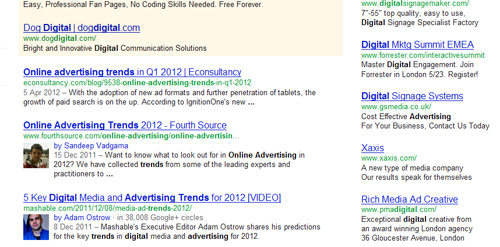We have heard a great deal in the SEO community recently about how the rel=author tag is likely to influence SEO in the near future. My thoughts are partly inspired by two excellent presentations at BrightonSEO by Glenn Jones and James Carson , although my conclusions probably differ somewhat.
What is the rel=author tag?
Before I get into the pros of cons of authors from Google’s perspective, it’s worth looking at exactly what authors are, and how they work.
In a nutshell, it’s a tag you append to articles, blogs etc. to indicate the author of said article. The current purpose of this is so that your photo can be included in the search results as a rich snippet, although to achieve this you must link back to a Google+ page.
In theory this post, although on Fourth Source, would link to my Google+ profile (which most people tend to check when both Facebook are Twitter are down, and it’s also a blue moon).

How the rel=author tag shows in the SERPs
Why is this important for SEO?
Although the current use for this tag, as mentioned above, is to provide an enhanced rich snippet in the search results, which would probably provide a boost to the click through rate achieved by those articles, there are likely to be bigger SEO implications.
It’s quite feasible that articles and blog posts could be evaluated based on the strength of not only the publishing website, but the author themselves. This means that a blog written by a well known expert in that industry would rank higher than if it was attributed to the office intern or ‘admin’, for instance.
Despite my reservations about just how much weight this will carry, I have little doubt that this will become a factor, and, in some fields, make a reasonable difference.
SEOMoz also make an excellent case as to how this could be extended to backlinks, by using the author in conjunction to the publishing domain to determine an Authored PageRank which would, in theory at least, add a much needed trust signal to backlinks.
Taken to its fullest potential, the data around the author could be used to map topics of expertise to the author, allowing Google to assign variable amounts of weight to an author’s view (or endorsement when it comes to links). This would mean, for instance, that if a well-known musician was to link to a record company it might carry more weight, than one to a political think tank or a new skin care product.
In Summary, websites with strong authors would benefit, as would those able to gain recognition from strong authors.
Isn’t this another thing SEOs will game?
Although I can see that, like social metrics, it’s another metric that would be more challenging for SEO’s to manipulate, I still feel it’d be also be a significant challenge for Google to make bulletproof. Although James Carson argued in his presentation that anonymous would be at mediocre, it doesn’t necessarily equate to the metric not being possible to game.
It’s feasible that agencies, content mills and the like will find ways to create seemingly reasonably authoritative social profiles to go alongside their content – while it might seem difficult to imagine a fake Google+ profile getting into millions of circles (not least because it’d take millions of people to actually use Google+), it’s quite foreseeable that, for instance, in the field of mortgages, a fake profile could get just enough traction (bought follows, frequent updates, promoted profiles etc) to pass off a respected commenter on that niche.
There’s also the potential for powerful authors to be exploited. For instance, if a blog has five actual writers, with one of them being a big name blogger, the most powerful blogger’s name could be used alongside all (or most) posts even though other members of the team wrote the article. At what point would Google decide that the author could not physically produce a given amount of posts in a day?
Just like ‘top diggers’ were paid to ‘digg’ content, top authors would quickly become commoditized should Google start to assign too much weight to this variable.
In my view, the lack of technical barriers, and transparency of the data sources involved in assessing authors, would make the metric easier to manipulate than pagerank in its current form.
So will it make a difference?
Although I feel this tag will be highly susceptible to manipulation, Search engines can still benefit significantly by integrating this metric as it allows them to diversify their algorithm. A mature search algorithm with many diverse signals is likely to outperform one based on few signals, although SEOs may be able to successfully game individual factors, it’s unlikely most in SEO will have the capability and skillset to manipulate several hundred signals.
Authors will play a role, and we’ll be encouraging our clients to make use of this tag, but it’s unlikely to be the new Pagerank. It’s quite likely that in certain fields, such as publishing, or in vertical search results, the metric will carry more weight, making it especially relevant to journalists.
Is content really king anyway?
Probably the biggest reason why I won’t be jumping onto the authors bandwagon and diverting disproportionate amounts of my time worrying about having ‘power authors’ is because I feel we are once again overestimating content, and misunderstanding it’s nature. Content in the form of Blog posts or articles are not the be all and end all of the internet: many search queries, especially commercial ones, are likely to have a different user-intent to those where an article/blog post is the likely destination.
I’d challenge that most pages (based on popularity of those viewed) are NOT editorial pieces of content, but instead home pages, product pages, categories, interactive tools and the like, where authors become less relevant.
Google also knows that popularity and credibility don’t necessarily go hand in hand, and that it needs to serve popular results to satisfy user expectations. When you think of flights for instance, how many budget airlines would you expect to have power authors, or to have endorsements by them? Furthermore, would you really care if they did? Most purchasing decisions online depend much more on price than the quality of the blog, and Google know this all too well.
So go ahead and make your webpages author tag friendly, request a new password to get back onto Google+, and start taking advantage of a what is undoubtedly a cool new addition for the web – just don’t expect it to change the world.





